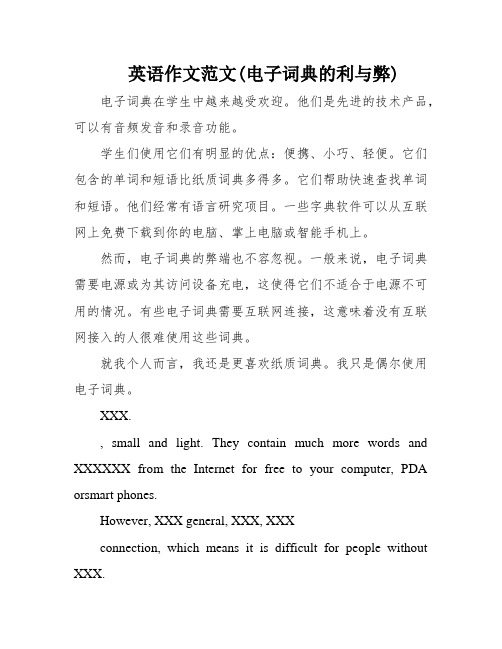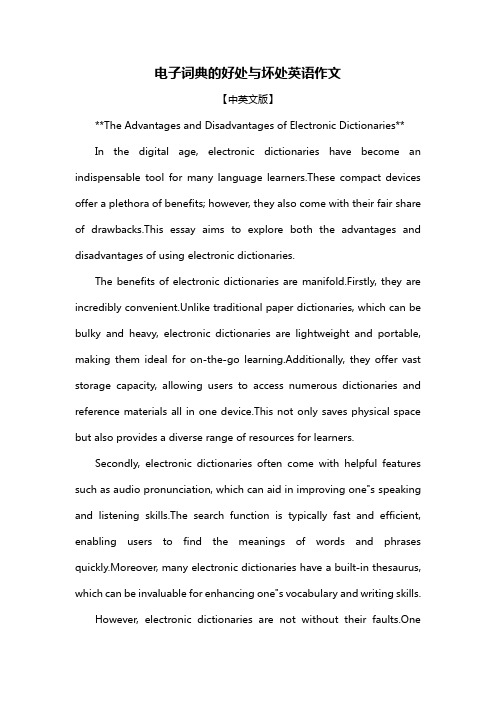掌上电子词典优缺点初探
电子词典的优点和缺点专四作文

电子词典的优点和缺点专四作文Electronic dictionaries have become a popular tool for language learners and individuals seeking quick access to definitions, translations, and language resources. They offer several advantages, such as convenience, portability, and a wide range of features. One of the main benefits of electronic dictionaries is their compact size, allowing users to carry them anywhere and access information on the go. They also offer multimedia features, such as audio pronunciation and example sentences, enhancing the learning experience. Additionally, electronic dictionaries often come with built-in search functions, making it easy to find specific words or phrases quickly.However, electronic dictionaries also have some drawbacks. One of the main disadvantages is their dependency on battery power, which can be a limitation when the battery runs out. Additionally, some users may find it challenging to navigate the interface or input text efficiently, leading to delays in accessing information. Furthermore, electronic dictionaries may not always provide accurate or comprehensive definitions, especially for specialized or technical terms.In conclusion, electronic dictionaries offer convenience and a wealth of features for language learners and individuals seeking quick access to language resources. While they have some limitations, such as battery dependency and potential inaccuracies, their benefits often outweigh the drawbacks, making them a valuable tool for enhancing language learning and communication.中文翻译:电子词典已成为语言学习者和需要快速查找定义、翻译和语言资源的个人的热门工具。
英语作文范文(电子词典的利与弊)

英语作文范文(电子词典的利与弊)电子词典在学生中越来越受欢迎。
他们是先进的技术产品,可以有音频发音和录音功能。
学生们使用它们有明显的优点:便携、小巧、轻便。
它们包含的单词和短语比纸质词典多得多。
它们帮助快速查找单词和短语。
他们经常有语言研究项目。
一些字典软件可以从互联网上免费下载到你的电脑、掌上电脑或智能手机上。
然而,电子词典的弊端也不容忽视。
一般来说,电子词典需要电源或为其访问设备充电,这使得它们不适合于电源不可用的情况。
有些电子词典需要互联网连接,这意味着没有互联网接入的人很难使用这些词典。
就我个人而言,我还是更喜欢纸质词典。
我只是偶尔使用电子词典。
XXX.
, small and light. They contain much more words and XXXXXX from the Internet for free to your computer, PDA orsmart phones.
However, XXX general, XXX, XXX
connection, which means it is difficult for people without XXX.。
电子词典的优点和缺点专四作文

电子词典的优点和缺点专四作文
《电子词典的那些事儿》
哎呀呀,咱今儿就来说说电子词典这玩意儿。
说起来电子词典的优点还真不少呢。
就像那次我在图书馆里查单词,碰见一个特别生僻的词,要是去翻那厚厚的纸质词典,还不知道得费多大功夫,我拿起电子词典一查,嘿,立马就出来了,多方便呀!而且电子词典携带起来也轻巧呀,不管走到哪,都能随时拿出来用用,可方便了。
但它也不是完美的啦。
有一回我着急用,结果它没电了,哎呀,把我给急得哟,这关键时刻掉链子呀!而且有时候操作起来还会有点小卡顿,感觉就像它在那“思考人生”一样,让人有点哭笑不得。
不过总的来说呢,电子词典还是给我们的学习和生活带来了很多便利。
虽然有那么一点小缺点,但谁还没点小毛病呀,咱还是得肯定它的作用。
咱可不能因为那点小小的不足,就否定了它的好呀。
在学习的道路上,电子词典还是能给咱不少帮助滴!希望未来电子词典能越来越好用,让我们用得更舒心啦!。
电子词典的好处与坏处英语作文

电子词典的好处与坏处英语作文【中英文版】**The Advantages and Disadvantages of Electronic Dictionaries**In the digital age, electronic dictionaries have become an indispensable tool for many language learners.These compact devices offer a plethora of benefits; however, they also come with their fair share of drawbacks.This essay aims to explore both the advantages and disadvantages of using electronic dictionaries.The benefits of electronic dictionaries are manifold.Firstly, they are incredibly convenient.Unlike traditional paper dictionaries, which can be bulky and heavy, electronic dictionaries are lightweight and portable, making them ideal for on-the-go learning.Additionally, they offer vast storage capacity, allowing users to access numerous dictionaries and reference materials all in one device.This not only saves physical space but also provides a diverse range of resources for learners.Secondly, electronic dictionaries often come with helpful features such as audio pronunciation, which can aid in improving one"s speaking and listening skills.The search function is typically fast and efficient, enabling users to find the meanings of words and phrases quickly.Moreover, many electronic dictionaries have a built-in thesaurus, which can be invaluable for enhancing one"s vocabulary and writing skills.However, electronic dictionaries are not without their faults.Onemajor drawback is their dependency on battery life.Once the battery runs out, the dictionary becomes unusable, which can be problematic if there is no immediate access to a power source.Furthermore, electronic devices can be susceptible to damage or malfunction, potentially resulting in the loss of valuable data.Another disadvantage is the potential for distraction.Electronic dictionaries often have additional features such as games, internet access, or social media applications, which can divert the user"s attention from their studies.Moreover, some argue that the ease of use might lead to over-reliance, resulting in a lack of effort in committing words to memory.Lastly, electronic dictionaries may not always provide the depth of information that traditional dictionaries offer.While they are excellent for quick look-ups, they might lack detailed etymologies, usage examples, or the nuanced explanations that can be found in print dictionaries.In conclusion, electronic dictionaries offer a multitude of benefits, including convenience, efficiency, and a wide range of resources.However, they also have their downsides, such as battery dependency, potential distractions, and a lack of in-depth information.As with any tool, the key is to use electronic dictionaries judiciously and complement them with other learning resources.**电子词典的好处与坏处**在数字化时代,电子词典已成为许多语言学习者不可或缺的工具。
电子词典的优缺点

电子词典的优缺点电子词典的优点1、小巧轻便与传统的纸质词典相比较,电子词典最直观的优点便是小巧轻便、便于携带。
电子词典的主要部件包括一个LCD 、26个字母的输入键盘、电池仓、耳机及USB 插孔。
通常是巴掌大小,拇指厚度,重量在500克左右,随身携带装在口袋里都不成问题。
2、查阅快速对广大学生来说,电子词典的查阅速度要快于纸质词典。
查阅电子词典时,使用者只需利用键盘输入单词即可查到相应词条。
例如,要在电子词典上查阅“apple”这个单词,只需输入“A”、“P”、“P”、“L”、“E”五个字母,就能得到解释。
3、发音功能电子词典作为当代科技进步的产物,具有纸质词典所没有的发音功能,而发音对语言学习者十分重要。
电子词典的发音功能可以帮助学生通过听和模仿,更直接、更快速地学习和掌握发音技巧。
4、内容丰富现在的电子词典里不仅有英汉双解、汉英、同反义词、习语、搭配等英语词典,有些电子词典还收录有大英百科全书、日语词典、新华字典、汉语大词典、成语词典、古汉语常用词词典等多种词典。
学生利用电子词典可以轻松快捷地查阅很多知识和资料。
电子词典的缺点1、词条数量少电子词典收入的词条数量少于纸质词典。
考虑到内存有限,电子词典的设计者和生产商在录入词典时,会去掉一些不常见、不重要的词条,比如一些含有特殊文化含义的词、拟声词、词组等。
2、单词释义少电子词典中的单词释义内容少于纸质词典,这是电子词典最让人头疼的问题。
纸质词典对单词的解释力求言简意赅。
而电子词典能做到言简,却不能保证意赅。
目前,市场上流行的电子词典往往仅用一到两个近义词对单词做出解释,然后给出中文意思(通常比它们给出的英文释义还要简短的多),删掉了能帮助人们更准确、更全面地了解单词的释义部分。
3、收入不规范词典在一般的电子词典中,很少有收入《新时代汉英大词典》或《新世纪汉英大词典》这样的权威汉英词典的。
可能由于知识产权问题,有些电子词典中录入的汉英词典水平不很高、缺乏权威性,有的电子词典甚至录入的是来路不明的词典。
电子词典的好处和坏处英语作文

The Pros and Cons of Electronic Dictionaries In the era of technological advancements, electronic dictionaries have become an integral part of language learning and translation. These handheld devices, often equipped with advanced features, have revolutionized theway we access and understand vocabulary. However, like any other technological tool, electronic dictionaries also have their share of benefits and drawbacks.The foremost advantage of electronic dictionaries is their convenience. Unlike traditional dictionaries, which can be bulky and cumbersome to carry, electronicdictionaries are lightweight and easily portable. This allows language learners and translators to have access toa vast array of words and phrases anytime, anywhere. Whether it's a quick lookup during a conversation or a thorough study session, electronic dictionaries provide instant access to definitions, examples, and pronunciations. Moreover, electronic dictionaries often come with additional features that enhance the learning experience. These can include audio pronunciations, verb conjugations, and even sample sentences in context. Such features notonly help in understanding the meaning of a word but also aid in its proper usage. Some electronic dictionaries also offer cross-referencing and thesaurus functions, which allow users to explore related words and synonyms, further expanding their vocabulary.However, despite these benefits, electronicdictionaries also have some notable downsides. One major concern is the potential for over-reliance. Some users may become too dependent on these devices, relying on them even for basic words they should know. This can lead to a decline in memory retention and affect their languageskills in the long run.Additionally, electronic dictionaries may not always provide accurate or complete information. While most devices are regularly updated with new words and definitions, they may still lack coverage of certain specialized vocabulary or nuances of language. This can lead to misunderstandings or inaccuracies in communication. Furthermore, the use of electronic dictionaries can sometimes disrupt the flow of reading or conversation. Constantly interrupting to check a word can be distractingand may hinder the overall comprehension of a text or dialogue.In conclusion, electronic dictionaries offer numerous advantages in terms of convenience, portability, and enhanced learning features. However, they also have their limitations and potential drawbacks. It is essential to use them as a supplementary tool rather than a replacement for traditional dictionaries or one's own language skills. By balancing their use with traditional methods of language learning, individuals can maximize the benefits of electronic dictionaries while minimizing their potential downsides.**电子词典的利与弊**在科技飞速发展的时代,电子词典已成为语言学习和翻译不可或缺的一部分。
电子词典的利弊作文
电子词典的利弊作文
在如今这个科技飞速发展的时代,电子词典已经成为了很多学生学习英语
的好帮手。
但这玩意儿就像一把双刃剑,有好的一面,也有让人头疼的地方。
先来说说电子词典的好处吧。
它可真是方便得不得了!你想想,以前咱们
查个单词,得抱着那厚厚的大词典,翻来翻去,累得手酸脖子疼。
现在有了电
子词典,轻轻一点,单词的意思、读音、例句啥的全都出来了,简直是瞬间满
足你的求知欲。
而且,这小家伙还能随身携带,装在兜里或者书包里,随时随
地都能拿出来用,不管是在公交车上还是课间休息,想学就学。
另外,电子词典的功能可多了去了。
不仅能查单词,还能练听力、做测试,有的甚至还有各种有趣的英语学习游戏。
这对于那些觉得学习英语枯燥无味的
同学来说,简直是福音啊,让学习变得有趣了不少。
但是,电子词典也不是完美无缺的。
比如说,有的同学太依赖它了,做作
业的时候一遇到不认识的单词,想都不想就去查电子词典,完全不动脑子思考。
这样一来,虽然作业是完成了,可知识却没真正学到心里去。
还有啊,用电子词典查单词的时候,有时候解释太简单或者不准确,容易
让人产生误解。
而且,老是盯着那小小的屏幕看,对眼睛也不好,一不小心就
变成“小眼镜”了。
所以说,电子词典这东西,有它的好处,但也得用得恰当。
咱们得把它当成学习的辅助工具,而不是偷懒的借口。
只有这样,才能真正发挥它的作用,让我们的英语学习更上一层楼!。
电子辞典的优点和缺点英语作文
电子辞典的优点和缺点英语作文Electronic dictionaries, also known as e-dictionaries, have become increasingly popular in recent years. They offer numerous advantages over traditional paper dictionaries, but they also have some drawbacks. In this article, we will explore the advantages and disadvantages of electronic dictionaries.First and foremost, electronic dictionaries are highly portable. Unlike their paper counterparts, which can be heavy and cumbersome to carry around, e-dictionaries can be easily stored in a pocket or a bag. This makes them ideal for students, professionals, and anyone who needs quick access to a dictionary on the go.Another advantage of electronic dictionaries is their extensive word databases. They contain a vast amount of words and phrases, often including idioms, slang, and technical terms. This comprehensive coverage ensures that users can find the meanings and translations of even the most obscure words. Additionally, e-dictionaries often provide example sentences and audio pronunciations, further enhancing the learning experience.Furthermore, electronic dictionaries offer advanced search functions. Users can search for words not only by their spelling but also by their pronunciation or even by handwriting recognition. This makes it easier for non-native English speakers to find the words they are looking for, as they can input the phonetic pronunciation or draw the characters if they are unsure about the spelling.In addition to these advantages, e-dictionaries also have some drawbacks. One of the main disadvantages is their reliance on technology. Unlike paper dictionaries, electronic dictionaries require batteries or a power source to function. If the batteries run out or there is no access to electricity, the e-dictionary becomes useless. This can be particularly problematic in situations where a reliable power source is not available, such as during outdoor activities or in remote areas.Another drawback is the potential for distractions. Electronic dictionaries often come with additional features, such as games, internet access, and multimedia capabilities.While these features can be entertaining and educational, they can also be distracting, especially for students who may be tempted to use the e-dictionary for purposes other than studying.Moreover, electronic dictionaries can be expensive. High-quality e-dictionaries with advanced features can be quite costly, making them less accessible to individuals with limited financial resources. Additionally, the constant need for software updates and upgrades can further add to the overall cost of owning and maintaining an electronic dictionary.In conclusion, electronic dictionaries offer numerous advantages, including portability, extensive word databases, and advanced search functions. However, they also have some drawbacks, such as reliance on technology, potential for distractions, and high cost. Despite these disadvantages, the benefits of electronic dictionaries outweigh the drawbacks for many users, making them an indispensable tool for language learners, professionals, and individuals who value convenience and efficiency in their daily lives.。
电子词典的优缺点英语作文100词
电子词典的优缺点英语作文100词英文回答:Electronic dictionaries (EDs) have become increasingly popular in recent years, offering a number of advantages over traditional paper dictionaries. Here are some of the key benefits and drawbacks of EDs:Advantages:Convenience: EDs are portable and easy to use, allowing you to access definitions and translations quickly and easily.Speed: EDs can search for words and phrases muchfaster than traditional dictionaries.Comprehensiveness: EDs typically contain a larger vocabulary than paper dictionaries, making them more likely to have the definition or translation you need.Additional features: Many EDs offer additional features such as synonyms, antonyms, pronunciation guides, and handwriting recognition, which can be very helpful when learning a new language.Disadvantages:Reliance on technology: EDs require batteries or an electrical outlet to operate, which can be inconvenient if you are in a situation where these are not available.Cost: EDs can be more expensive than paper dictionaries, especially high-end models with advanced features.Lack of context: EDs only provide definitions and translations, not the broader context that you can find in a paper dictionary. This can make it difficult to understand the nuances of a word or phrase.Distraction: EDs can be distracting, especially if youare using them to study or work. The temptation to browse other features or play games can be overwhelming.Overall, EDs offer a number of advantages over traditional paper dictionaries, including convenience, speed, comprehensiveness, and additional features. However, they also have some drawbacks, such as reliance on technology, cost, lack of context, and potential for distraction. Whether an ED is the right choice for you depends on your individual needs and preferences.中文回答:优点:便携性,电子词典小巧易携带,随时随地查阅释义。
试论电子词典在中学英语学习中的优缺点
试论电子词典在中学英语学习中的优缺点作者:韩大军来源:《中国教育技术装备》2011年第32期摘要电子词典作为现代科技发展的产物,以其先进的功能为学生的英语学习提供了极大的便利,因而受到越来越多的学生的青睐。
然而,学生对电子词典的过分依赖和不当使用却会影响到实际的学习效果。
因此,教师应引导学生正确、合理地使用电子词典,使其发挥最佳功效。
关键词电子词典;纸质词典;英语学习电子词典的分类及其优势“词典是汇集词语(含词语的组合或词语的某些成分)、加以分别处理、提供一定数量信息、并按一定方式编排的工具书。
”[1]英语词典是英语学习者必备的学习工具,如何有效使用英语词典也一直是英语教师所关注的问题。
以前,教师通常提倡学生使用的词典大多为《牛津》《朗文》《新英汉》等纸质词典。
随着科技的开展,电子词典应运而生。
一般而言,电子词典主要有三种形式:掌上词典(如文曲星、快译通、好易通等系列产品);个人电脑词典(又称光盘词典,如即时通、地球村、汉神词海、金山词霸、东方快车等),以及在线词典。
而在线词典中,既有传统印刷本词典的在线版(如《牛津英语在线词典》《韦氏英语在线词典》《美国传统词典》),又有在线语言词典门户网站和搜索引擎类网站提供的在线词典,电子词典之所以能得到迅猛的发展和广大学生的青睐,是因为它有诸多优点。
携带方便根据调查,纸质词典重约2 000克,由于客观情况的限制或主观因素的影响,很多情况下使用者不便或不愿携带。
而电子词典重约仅为100克,且体积小,不管是在课堂、自习、还是旅途中,使用者都可以随身携带及使用,这给学习者带来更多的方便。
屏幕取词个人电脑词典一般都可以做到光标指向电脑屏幕的任意位置,相应位置的中英文单词、词语或短语的详细释义即可直接显示在屏幕上的浮动窗口上,这项功能在进行英语阅读或上网查找资料时特别简洁实用。
具有词库扩充的特点随着时代的进步,不断有新的词语或各种专业术语产生,所以任何一部词典都无法收录所有的词汇,必须随时对词库进行动态的修改增添。
- 1、下载文档前请自行甄别文档内容的完整性,平台不提供额外的编辑、内容补充、找答案等附加服务。
- 2、"仅部分预览"的文档,不可在线预览部分如存在完整性等问题,可反馈申请退款(可完整预览的文档不适用该条件!)。
- 3、如文档侵犯您的权益,请联系客服反馈,我们会尽快为您处理(人工客服工作时间:9:00-18:30)。
掌上电子词典优缺点初探
发表时间:2011-03-11T10:58:47.793Z 来源:《时代英语报教学研究月刊》2010年第11-12期供稿作者:马梅[导读] 掌上电子词典经历了数代更新,机体变得更小巧、轻便、美观。
近年来,越来越多的中小学生使用掌上电子词典(Pocket Electronic Dictionary) 来取代传统的普通纸质词典(Paper Dictionary)。
集词典、笔记本、计算器、闹钟等功能于一身的文曲星、步步高等掌上电子词典越来越受到中小学生的青睐,尤其是它的多功能、方便快捷等优点更是使学生们爱不释手。
但是,相当一部分学生家长和部分外语教师对这一普通纸质词典的替代品持怀疑甚至否定的态度。
他们观察到孩子们在进行阅读和听力练习、翻译,甚至在回答问题时,都手不离掌上电子词典。
他们担心对电子词典过于依赖会给孩子的英语学习带来负面影响。
那么掌上电子词典于中小学生的英语学习而言到底是利大于弊还是弊大于利呢?它的利与弊到底有哪些呢?本人结合自己工作中的观察、学习、调查、思考,对掌上电子词典的优缺点作了一些初步的探讨。
掌上电子词典得到迅猛的发展,受到中小学生的青睐是和它的显著优势分不开的。
优点一:词量丰富。
掌上电子词典经历了数代更新,机体变得更小巧、轻便、美观。
由于存储空间的极大扩展,掌上电子词典虽然只有巴掌大小,重量仅100 克左右,但收词量却可以和重达2公斤的普通纸质大词典相媲美。
一本电子词典含有好几本纸质词典的容量,有时查词可以互相参照,取长补短。
优点二:功能多样。
现在的掌上电子词典除具有基本的词典功能外,还有更加完善的附加功能,如复习考试、资料存储、计算理财、时钟日历、游戏娱乐、汉英功能等功能。
有的机型还可以插卡,用户还可以根据需要购买某语种的存储卡。
现在不少的电子辞典还设有以艾宾浩斯遗忘曲线为基础的一个限时记忆,定时巩固,帮助记牢单词的程序。
优点三:使用便捷
掌上电子词典在实际使用中对中小学生的英语学习起到了辅助的作用,它是广大中小学生学习上的助手。
首先,掌上电子词典小而轻,方便随身携带,能随时随地查阅。
其次,现在掌上电子词典所具有的拷贝功能可以方便地把学生所需的例句、用法、音标拷贝到词典中,而无需用笔记下繁多的笔记。
再次,很多同学对动词的搭配和运用有较大的疑惑,认为纷繁复杂的动词搭配是英语学不好的症结之一。
后期生产的电子辞典已经注意到这一点,把单词与它的词根、习语、片语、例句、衍生、复合等联系起来,使学生在使用掌上电子词典时更加的便捷。
最后,学生在阅读文章时,不需要准确了解单词地衍生、习语、惯用搭配等。
在这种情况下,电子辞典的方便快捷就比详尽的纸质词典有着显而易见的优势了。
掌上电子词典的优点如上文所述显而易见。
那么为什么有着如此多优点的掌上电子词典却又受到众多家长甚至英语教育专家的怀疑和担忧呢?北京外国语大学吴冰教授就曾语重心长地说:“要想学好英语,得不怕麻烦勤查外国人为初学者编写的词典。
”接下来我就来谈谈掌上电子词典的缺点。
缺点一:影响猜词。
学英语喜欢拿一本电子词典,遇到陌生单词就查阅,这一习惯不利于英语学习,因为过于依赖电子词典,猜词能力难以提高。
对于使用电子词典的利和弊,优点在于学生可以快速、便捷地查出生词含义,提高学习效率;缺点也在这个“快”上,学生对其的依赖性太大,遇到生词就用电子词典,完全忽略了英语学习需要猜词能力的培养。
缺点二:释例简单。
笔者在班级中对学生所购买的电子词典的使用及到商店中实地试用,发现几乎很难有电子词典的释义和例证能够令人满意。
纳森在谈及词汇知识时论述道:“词汇知识也包括词语搭配、短语、习语、风格、语域。
就语域而言,词汇有正式、非正式、褒义、贬义、抽象与具体之分。
在词汇学习时必须掌握词的内涵、外延,注意其准确性。
”虽然现在市场上的不少电子词典都在积极地弥补自身的不足,增加例句,同义词辨析,派生词,词语搭配甚至语法信息,但例句以及词的用法信息等还是无法像纸质词典那样全面丰富。
缺点三:屏显较小。
绝大多数学生认为,查电子词典比查纸质词典要快许多。
实际上,由于电子词典的显示屏每次只能显示四五行,一般需要翻页好几次才能看完一个词条的全部注解、例句等,如果要查询词的搭配、辨析、派生、对中学生英语学习中使用电子词典的思考同义词等信息,更是需要切换好几次,而且分页式解释也会影响学生对词义的全面理解和对比。
目前还没有哪一品牌的哪个型号完整收录一本中型版权汉英词典。
研发人员为了适应掌上电子词典屏显较小的缺憾,他们往往以某本汉英词典为蓝本,删除例句,减少义项,自编词典。
这样的词典总是给人一种简单、拼凑的感觉。
这样编成的词典学习功能必然大打折扣,使用效果可想而知。
传统的纸质词典则不然,显示在学生眼前的是32k的纸张,内容更丰富翔实。
缺点四:喧宾夺主。
初为学习用,后变娱乐机。
许多同学一般都是在刚入学时购买了电子词典,刚开始还把它当成学习的工具,但随着对环境的熟悉、学习的乏味,就把电子词典当成游戏机用了。
某些品牌的高档产品集电脑辞典、数码复读、MP5、移动U盘等多功能于一身,在市场价格高达900元左右。
这些功能大有喧宾夺主之势,不仅没能帮助学生学习,反而分散了他们的注意力,学生容易在这些功能上浪费时间,从而违背了当初购买电子词典用来提高英语学习成绩的初衷。
对学生来说,掌上电子词典并不一定是越贵就越好,因为其中许多功能很少被学生利用,有时反而会对学生的学习起一定的干扰作用。
综上所述,看来掌上电子词典是一把双刃剑,有利有弊。
其实学生在使用掌上电子词典时只要把握一个最基本的原则:能够帮助自己更好地、方便地、正确地学习英语,说到底就是“适合自己的才是最好的”。
只有如此才能对掌上电子词典做到扬长避短,充分发挥其优势。
(作者单位:如东县袁庄小学)。
